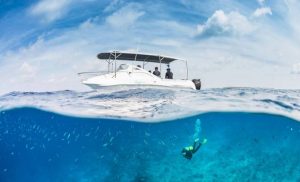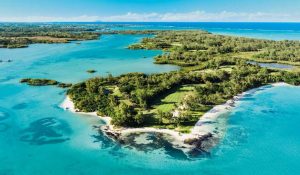Victoria, Mahé, Seychelles, April 17, 2020 / travelindex.com / COVID-19, while serving to unite the world against a common enemy, has also brought the world of tourism to its knees. For the most part, countries have closed their borders, planes have been grounded, and travellers are on lock-down; all in a bid to stop the spread of the virus. These drastic measures, however necessary under the circumstances, have tightened the noose around the neck of tourism-reliant businesses, many of which cannot survive the months of financial uncertainty to come. This extends from the humble fisherman who sold his daily catch to the hotels, to the large-scale Destination Management Companies (DMCs) that employ hundreds of staff. Countries that took tourism for granted are today feeling the financial strain associated with the unprecedented demise of the once thriving industry.
Each Country’s Tourism Ministry and Tourism Organizations need to start making the necessary plans and preparations for how to re-establish itself in the tourism market when the pandemic runs its course and the gates re-open. The Seychelles Government, on its part, has generated a stimulus package, but whether it will be adequate to keep the economy afloat in the long-run remains to be seen.
Christopher Gill, the Chairman of the “Praslin Island Business Association” recently stated that “supporting workers only and allowing tourism assets to deteriorate will leave us with a situation not dissimilar to Syria, albeit not to that extent”. A very recent visit by an influential and well-travelled tourism personality described our ‘product’ (i.e. Seychelles and the manner in which we market it) as being ‘tired’. When asked whether he would return for a holiday, he said “No. The hotels I visited are tired and there is nothing to do. There are no restaurants, no areas to sit and see the island’s culture etc”. In discussions, he noted that Seychelles needs to abandon its current portrayal as being the idyllic destination for honeymooners; we are not living up to expectations and we need to reinvent ourselves.
Repeat visits by holiday-makers are low in numbers. This is a fact. It is no secret that the very heart of our main island of Mahe, namely Victoria, shuts down promptly and without apology at 4:00pm. Local eateries with sufficient seating are few and far between, and our nature trails and beaches are viewed by tourists as being unsafe and oftentimes unclean. Despite this, as a tourism-reliant Country we continue to brand ourselves as an up-market destination, and we insist on pricing ourselves out of the market.
If we are not prepared to rebrand and to develop long-term marketing strategies from the get-go, we will find ourselves ill-placed to compete with hundreds of other Countries, most of which have larger budgets to play with than we do, targeting the same pool of tourists that we are hoping to attract to our shores.
In the interim, local tourism-reliant businesses and the Nation as a whole are continuing to grapple with exorbitant electricity charges, high internet access rates, costs of labor that are highest in the region, new landing fees over and above the already factured passenger service fee in place, and a handling fee for airlines that triples or even in some cases that is over four times what is applicable in the adjacent competiting destinations. Seychelles is dependent upon its tourism industry and must be seen to be going the extra mile to make their tourism industry work.
Operation Hope for Tourism by the Africa Tourism Task Force
The Task Force set up under the Chairmanship of Dr Taleb Rifai , the former Secretary General of the UNWTO with myself as his Vice Chairman has been meeting weekly with three key set targets:- namely containment of the COVID-19 pandemic, searching for possible assistance for the industry and thirdly planning the reopening of tourism as an industry.
Many influential and very succesful Tourism Ministers and former Ministers are working alongside tourism industry leaders in this Task Force. Everyone in dedicating time and effort to make a difference through ‘Project Hope’. Sitting Tourism Ministers such as Minister Najib Balala for Kenya, Minister Edmond Bartlett of Jamaica and Minister Moses Vilakati of Eswatini are Task Force Members.
The last meeting of the Task Force agreed to move emphasis from stage of containment into stage of recovery, discussed funds to be spent on the tourism industry and the presumption that tourism as an industry may well be the last to recover after COVID-19.
In collaboration with the African Union and the European Union and with the aim of now involving each of the fifty four States of Africa the Task Force is pushing Project Hope in a bid to assist with the recovery of tourism. The Task Force has discussed at length the idea that digital will now be the name of the game and are working on ways and means to assist tourism destinations with U-Tube DVDs to keep destinations visible and relevant bearing in mind that people will not start travelling tomorrow.
The Task Force will also be opening its meeting to world press in a bid to engage everyone and to mobilise the tourism industry at large to stand behind ‘Operation Hope’.
Empty Resorts – Empty Streets at Night – Empty Airport and Empty Pockets but Looking with Positive Energy into the Future
It was two and a half months ago, when a discussion emerged among tourism stakeholders in the Seychelles, what the future would hold vis a vis constantly climbing visitor numbers, establishing arrival record after arrival record for the past decade.
I remember the 2007 / 2008 global financial crisis, when the paradise islands stared at a downturn of arrivals of as much as a third, and then brought in Alain St. Ange as Director of Tourism Marketing to reshuffle the deck of marketing cards and have the wind of change blow through the corridors of the Seychelles Tourism Board.
He started the juggernaut of marketing, with the Seychelles punching well above their regular ‘weight class‘ and turning the islands into one of the most desired island tourism destinations in the world.
Those were the days of the Carnival de Carnavales, the International Carnival Festival in Victoria, when at the launch event some 150 media houses from around the world had been invited to give prominence to the islands’ many attractions and to witness the friendly enthusiasm the Seychellois people displayed.
I was privileged to attend all the carnivals up to the time the last one was staged together with the Festival Creole a few years ago, before the idea was put back into the drawers. Tourism was booming and I, during media conferences along the way with the then Minister for Tourism and Culture Alain St. Ange, repeatedly asked the question of carrying capacity – this being the crucial moment when the islands’ infrastructure and services would reach their limit in receiving more visitors.
Electricity, water, supplies and crucially also staffing was an issue, as were suitable locations for new resorts. This led to a moratorium on the construction of new large scale resort projects across the islands, one that still exists.
In 2019 did the Seychelles receive 384.204 visitors, up from the previous year’s record of 351.235 and for 2020 was the 400.000 mark in sight – when COVID19 struck.
Available bed statistics from the tourism ministry confirm that across the islands there are about 589 licensed tourism establishments in operation accounting for 6,332 rooms.
Deliberations are no doubt continuing where the magic cut off figure may stand, at 450.000 or at 475.000 or even at the half million mark but for now, are the resort and hotel beds empty, staff has been laid off on significant scale and most airlines, apart from cargo flights, have halted their services, including the domestic flights between Mahe and Praslin. The few additional flights coming and going were given permission to fly in empty to evacuate stranded tourists to their home countries and while some still remain, have the numbers dwindled to insignificant.
This left new hotels due to open in a financial doldrum while existing hotels too were stripped of income and yet have fixed costs to bear on a monthly basis.
A night time curfew, despite the relatively low case load of the Seychelles – only 11 cases have been reported so far largely as a result of the prompt and resolute reaction of the government when the crisis broke out – now has the Seychelles people stay at home from dusk to dawn, as the active cases are being treated and tests are carried out among potential contact groups to see if more positive individuals might be found.
Non essential services too have been halted across the islands with ‘essential services‘ being described shops selling necessary commodities like food and groceries, banks, public utilities and health care facilities. Construction sites have been closed though fishing is ongoing to provide food for the people.
‘This is the worst situation in my living memory‘ said a regular source from Victoria before adding ‘Tourism has seen a steady growth over the decades and despite a crisis here and there, like the Gulf was, the post 9-11 era and the financial crisis of 2007/8, we always stayed afloat. We had many challenges to overcome, high taxes, recruitments, the high cost of utilities and imports but we always succeeded in moving forward. Now, this is unprecedented and never have the islands been empty of visitors like this. Yachts cannot enter our ports, cruise ships are banned and the airport is closed for all but essential cargo or evacuation flights. Our only hope now is that once the outbreak is contained in our main tourist source markets, markets which are the heaviest hit in the world by the pandemic, visitors will return to the islands again.
Spotted! Alphonse Island’s Resident Marine Biologists Discover Orcas in the Seychelles
For the First Time, Alphonse Island’s Resident Marine Biologists Discover Orcas (Orcinus Orca) in the Alphonse Group, Seychelles. First the first time ever a pod of orcas, otherwise known as killer whales, were spotted off the west coast of Alphonse Island.
The sighting happened on a Blue Safari Seychelles training dive tip off the west coast of Alphonse Island. This is the first time that these majestic mammals have been spotted in the tropical waters near Alphonse Island.
The pod that comprised of roughly seven to nine Orcas were observed for approximately 60 minutes and delighted Alphonse’s divers and resident marine biologist. The unexpected Orca pod sighting highlights how much there is still to learn about the remarkable marine life that inhabits the Indian Ocean surrounding the Alphonse Group.
About Orcas
Orcas are highly intelligent apex predators and are one of the most widely spread cetaceans (group comprising of Whales, Dolphins and Porpoises).
They are found in all oceans of the world yet are very rare in tropical waters. This encounter was the first of its kind for the Blue Safari Seychelles team and the first time Orcas have ever been seen in the Alphonse Group.
This incredible sighting emphasises the need for long-term monitoring of cetaceans particularly in these remote tropical environments, data can then be used to enhance our understanding of the species, their migration routes and then ultimately be used to implement conservation management strategies.
Known for its commitment to the protection and preservation of the marine and land wildlife and environment, Blue Safari Seychelles will share data from this incredible encounter with their partner non-profit organisation, ICS (Island Conservation Society). This cetacean sighting data will be recorded and utilised accordingly.
The brand-new sighting of Orcas highlights the exceptional diversity of marine life that inhabits the waters surrounding the remote and pristine Alphonse Group of Islands, which encompasses Alphonse Island, Bijoutier and St. François, all of which have a rich and protected geo-diversity, and both marine and land-based wildlife. For nature and adventure travellers, the Alphonse Group of Islands is the perfect place to disconnect from modern life and reconnect with the remarkable natural environment and wildlife.
Coronavirus: Congratulations to Didier Robert for creating an “Outstanding 2020 Tourism Recovery Committee”
The tourism stakeholders of Reunion Island met by videoconference with the President of the Region. “We are facing an extremely urgent situation in which we must activate all possible levers,” said Didier Robert.
The President of the Reunion Region met with tourism stakeholders in order to define measures to be implemented to allow the survival of the sector strongly impacted by the health crisis. Didier Robert wants all stakeholders to come together around the same action plan.
Present at this exchange led by videoconference, Pascal Gauci Secretary General for Regional Affairs at the Prefecture, Stéphane Fouassin and Susan Soba, President and General Director of Ile de La Réunion Tourism, Azeddine Bouali and Gérard Argien, President and Director of the Réunion Tourism Federation, Catherine Frécaut, President of Travel Companies, Patrick Serveaux, President of UMIH, Christian Wolff, President of the Union of Hoteliers of La Réunion, Didier Fauchard President of MEDEF, Katherine Chatel, for the Movement Companies from France, Lisianne Doki-Thonon for CPME, Pascal Viroleau Director of the Vanilla Islands. Yves Sculier, President of the Association for the Defense of Independent Tourism Professionals in Reunion, Mathieu Pitou, President of the Réunion Association of Tourist Guides, Sophie Durville, President of the Tourism Club, Agnès Lavaud for the Union of Professionals of Leisure activities, Jérôme Turpin, President of the National Syndicate of Mountain Guides, Régine Moutan-Virin, President of Clévacances Réunion, Alain Boyer for the Association of Mountain Lodge Managers, Frédéric Segart, President of Gîtes de France, Eric Legrigeois and Henri Dupuis, Managing Director and Chief Operating Officer of the Grand Port Maritime. All are unanimous, it is advisable to deal with the urgency of the present and to anticipate the devices for a restarting of the tourist activity, as soon as the crisis has ended. Whether in the air, cruises, receptive agencies, hotels, restaurants, lodges, tourism observatories, etc., each profession is exposed to great difficulties that do not allow them to pursue a normal activity on the long term.
“We are facing a situation of extreme urgency where we must activate all possible levers. The Regional Solidarity Fund that we defined last week in the company of economic actors, must take on its full meaning here. Same thing for the Fund of national solidarity carried by the Government “, affirms Didier Robert. Already existing emergency measures such as partial unemployment must be activated now.
The services of the Region, in particular the Department of Economic Affairs, the IRT, the FRT remain fully mobilized to support the players in tourism, the strategic and locomotive sector of the economy of the territory. Didier Robert thus defined 3 main guidelines: Emergency aid: -The President will bring together the banking establishments concerning the procedures for applying the guarantees granted to companies. -The National and Regional Support Fund systems will be open from the first days of April. -The Guarantee Fund and Rebound Loan schemes must enable businesses to quickly benefit from cash flow. -A sensitization with state services to achieve better fluidity and speed in the registration and processing of partial unemployment demanded by companies. -The immediate mobilization of the services of the Region.
A long-term strategy -The creation of an exceptional 2020 tourism revitalization committee within the Region in order to jointly manage the situation. The President of the Region invites the actors to join this space for reflection to collectively provide solutions. -As soon as activity resumes, strong action must be taken with local customers because this unprecedented health crisis will change the behavior of each Reunionais with regard to local consumption.
Strong commitment from European ERDF funds -Support and a particular effort towards the airlines must be put in place, as well as a reassessment of the budgets of the IRT and the FRT, in particular by a stronger mobilization of European funds.











